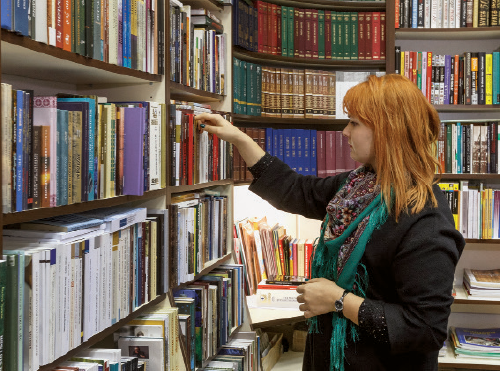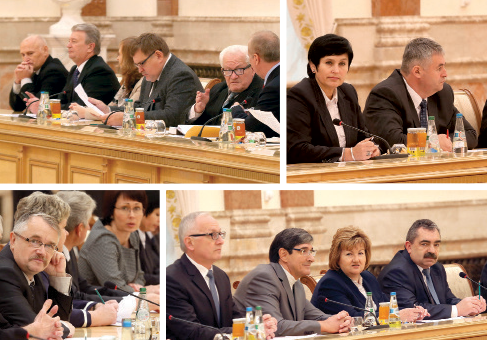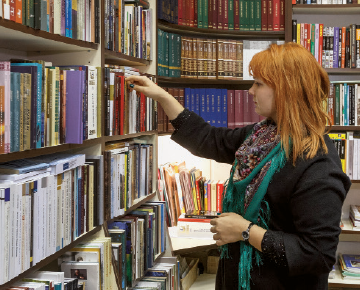Alexander Lukashenko urges Belarusian writers to work with ideas, characters and plot, to appeal to modern day readers

In one of Minsk’s bookstores
Speaking to a gathering of writers the President pondered wonder it has been so long since a literary classic has been born, to stand alongside War and Peace or Virgin Soil Upturned. “Is it due to lack of talent? Or due to objective life conditions, whereby books are no longer our main source of information?” he mused. The Head of State believes that changes in reading habits cannot be laid only at the door of the technological revolution, being convinced that people seek stories which are immediately captivating, being a remedy against boredom. He even stated that ‘serious literature has become the domain of intellectuals’.
Mr. Lukashenko suggested focusing on major literary components and discussing the role of readers, books and writers. He emphasised that the meeting had brought together interesting and extraordinary people, capable of discussing not only the current state of Belarusian literature, but the spirituality, culture and historical choices of Belarus.
He added, “Scientists say that state economic, political and military advantages never exist independently, being linked to a nation’s spirituality and culture. The development of society and the life of the nation relies upon science, education and culture.” He invited those at the meeting to discuss the role of fiction in this process and urged that Belarusian literature had not yet plunged into the twilight. “Throughout the history of our nation, literature has always been the means of learning about the world and educating us,” said the Head of State. “The poetry and prose of Kupala and Kolas, Bogdanovich and Melezh, Korotkevich and Bykov are a source of national pride for many generations of Belarusians.”
He continued, “Why does contemporary Belarusian literature fall short of the highest standards set by our great writers? Maybe, mental inertia hampers venerable writers while the younger generation lacks worldly wisdom and experience? Or is it because times have changed and our literature is just following global trends, losing its national identity?”

Participants of the meeting
The President drew attention to the fact that literature has always been a source of ideas and themes for other art forms and asked how this artistic partnership is now developing. He underlined that, in the time of the Soviet Union, creative intellectuals often complained about censorship and the rigidity of socialist realism. “However, it was in those years that literature earned the highest level of respect. Yevgeny Yevtushenko once described writers as people ‘infused with the proud spirit of citizenship, who shun comfort and rest’,” added the Head of State.
“When I watch films or read editions by great writers, or admire works by artists and other such people, I’m surprised by statements that they were allegedly oppressed during Soviet times and could not work properly,” said the President. “However, all received titles of people’s writers. All lived excellent lives back then. Therefore, I can say that complaining must simply be fashionable today, although nobody dictates what and how you should write. Censorship and state monopoly of the printed word are a thing of the past. However, this freedom has not led to the emergence of great literature. Instead it has split the writing community. Have we created a dead end? Or do you have hope for restoring this creative field?” he asked.
The writers told the President about the issues that concerned them most. In particular, they discussed modern trends in literature and pointed to waning interest in books worldwide, not only in Belarus. They said that, at present, literature faces hard times.
When asked why domestic authors and their works are so poorly advertised, the President again returned to the topic of quality. “Tell me, what should be advertised? Give us books that deserve to be advertised and we’ll find money to do so,” he noted.
The President demands that public funds spent on supporting intellectuals should yield results. In particular, he drew attention to the fact that the Government invests in promoting the film industry. “This has not yet yielded results - and this is the people’s money,” he asserted.
The state wants writers to help promote citizenship and patriotism. Money does not always play a major role here. The most important thing is talent. Participants of the meeting gave examples of people who had nothing to do with art, but who managed to write very popular books, without receiving major investment.
Discussion of literature gradually gave way to discussion of education. The attendees noted that literature currently included on the school curriculum lacks sufficient authors writing in Belarusian language. They are convinced that more should be done to promote the native language in Belarus and abroad. A suggestion was also voiced to consider establishing a national university, where all disciplines would be taught through the language of Belarusian.
The work of publishing houses came under debate, with authors convinced that it’s necessary to study readers’ preferences; they suggested a competitive approach to publishing, if subsidised by the Government.
Continuing this topic, Mr. Lukashenko noted that publishing houses violating the law will be shut down. “The Government will act within the law and in line with the moral principles of society,” said the President. “I always ask civil servants to be honest and fair. If some publishing houses do not respect these principles, they will be shut down. This is my position. If a minister does not act appropriately and I find out that he has failed in his duty because of some opportunistic reason, he will be fired the next day.”
Mr. Lukashenko noted brutality and violence are too prevalent in films and books, and believes that readers and viewers are already fed up. He asserts that television and cinema lack popular works telling stories about the life of ordinary people.
Participants of the meeting suggested instituting a major literary contest: an idea upheld by the President. He noted that the selection criteria should be developed by writers and suggested conducting such a contest this year. He promised to attend its final, when the results would be announced.
At the end of the meeting, the Head of State noted that many themes remained untouched and suggested continuing the conversation later. Mr. Lukashenko asked that the next meeting tackle issues that can be solved only at presidential level.











